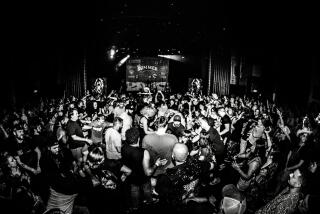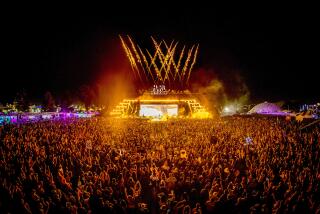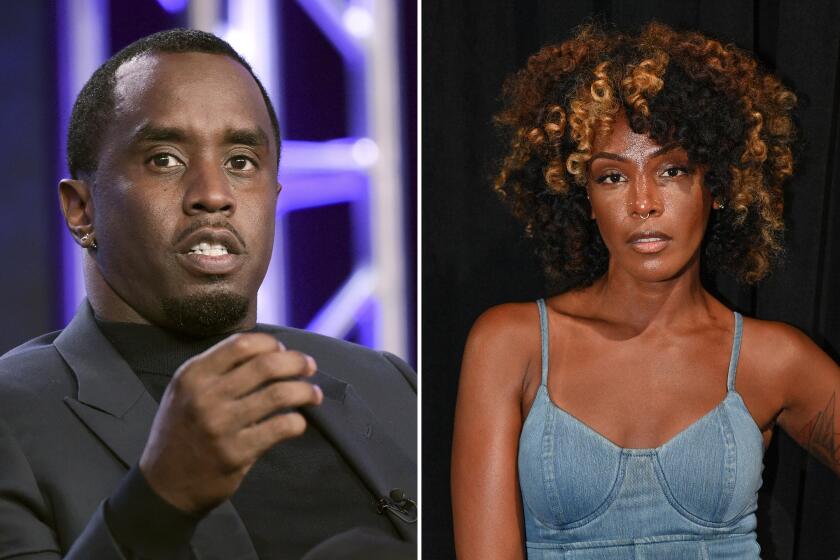Hard Summer festival moves on to bigger beats
The British dance-punk band Bloc Party returns to the U.S. on Friday night as headliner of the two-day Hard Summer festival in Chinatown’s Los Angeles State Historic Park. The huge popularity of the annual electronica-heavy festival owes a debt to bands like Bloc Party, who helped make dance music safe for young rock fans in the 2000s.
Yet Bloc Party’s Hard headlining date comes just as the band shed most of its pioneering club influences on its new album “Four,” a fanged and heavy record that focuses on live musicianship and ferocious guitar work.
“Electronica has been such a huge influence on us, and it’s always been there,” singer Kele Okereke said. “But this is the first record that consciously steps away from that. It’s interesting that we were asked to play this fest, it’s a really interesting test. We want people to move, but we want to use a different set of tools.”
Just as electronica music has saturated America’s top 10, both the band and the 5-year-old festival’s bookers are asking big questions about what comes next for the genre. What counts as dance music today? How can it keep growing commercially while keeping its freewheeling foundation? And can it sustain the incredible wave of new interest?
Bloc Party isn’t the only act testing the edges of what counts as dance music at Hard. Bands such as Little Dragon and Miike Snow use electronics in ways that sound like techno but move like rock and film music. Perhaps the boldest booking is Parliament Funkadelic bassist Bootsy Collins, whose groundbreaking grooves from the 1970s and ‘80s launched a thousand rap and dance samples.
“Everything I’ve done is just what I thought was cool,” said Gary Richards, the founder of Hard Events. “I learned that lesson a long time ago — you can try to use a formula to make a hit, and nine times out of 10, it won’t work.”
This year is Hard’s first in its five years to expand to two nights (the local dubstep and techno auteur Skrillex headlines Saturday). It’s also the first festival since organizer Hard Events announced its acquisition by Live Nation in June, a major move that could change dance festival culture in L.A. and beyond by incorporating the lively event into a major booking conglomerate.”
While festivals like Electric Daisy and Electric Zoo are largely focused on single-DJ sets and massive light shows, Hard has a wide array of live setups, including Skrillex’s computer-centered rig, Danny Brown’s maniacal rapping and Bloc Party’s live band. But young audiences and artists draw less distinction between genres today, and that puts Hard in a good position to evolve as it begins its Live Nation relationship.
Most of this weekend’s festival was booked and planned before the merger. Though Live Nation may play a larger role in translating the festival abroad (Richards said Europe is a natural first place to start looking), the fact of its two-day expansion signals broader goals, and something of a redemption from the disastrous 2010 year when, after Electric Daisy was marred by a teen’s drug overdose death, Hard Events canceled its summer festival and moved its individual sets to later dates.
Hard Events has a better relationship with the city (Metro is keeping all of its trains running late to accommodate the fest), but the incident still smarts.
“That was definitely a dark cloud, but our track record is solid and every event is a new event,” Richards said. “It’s not the music’s fault, and this city, especially downtown L.A., deserves a great electronica festival.”
Hard Summer’s growth suggests that L.A. is getting that long-term wish. The idea behind millennial acts like Bloc Party — that dance, rock and beat music shouldn’t be mutually exclusive — will be fulfilled at this year’s fest.
“My mom and dad turned me onto funk and disco, and P-Funk has always been a staple. My dad is coming on Friday night, and I’m so glad I can put Bootsy Collins on a stage with Chromeo and James Murphy,” Richards said. “In my opinion, it’s important to have people playing live music, it can’t just be machines and computers. The question of ‘Pink Floyd or Led Zeppelin’ is still my lifelong dilemma.”
More to Read
The biggest entertainment stories
Get our big stories about Hollywood, film, television, music, arts, culture and more right in your inbox as soon as they publish.
You may occasionally receive promotional content from the Los Angeles Times.











